Nathaniel Brooks was less a man and more a force of nature—a hurricane contained within a tailor-made, $10,000 suit. At only thirty-five, he had forged an empire in Los Angeles real estate, owning glittering skyscrapers that served as his monuments, cold towers of glass and steel that physically touched the clouds. He drove vehicles that whispered of obscene wealth, and when he spoke, it was with the calculated, cutting arrogance of a man who believed he had not merely succeeded in the world, but had conquered it entirely.
The world saw the ruthlessness, the discipline, and the cold brilliance. They envied and feared him. But beneath that flawless, expensive veneer of success hid a primal, continuous ache: the pain of a lonely orphan boy.
Abandoned at seven after his father’s sudden death, Nathaniel was tossed into the brutal, unforgiving circuit of foster homes, where every kindness was fleeting and every lesson was learned through pain and betrayal. He was hardened, not just by circumstance, but by choice. His deepest wound remained the disappearance of his mother, Grace Brooks.
She vanished shortly after his father died, an absence that Nathaniel’s young, wounded mind translated into a simple, crushing truth: She left me. He had spent years—years that morphed from hopeful childhood into cynical adulthood—hiring the best private investigators to track her. No one ever found a trace.
Eventually, his searching ceased, replaced by a deep, unforgiving bitterness. “She chose to leave,” he used to say to his closest confidantes (of which there were few), his voice colder than the marble floors of his penthouse. “So I learned to live without her.
I learned to build a life where I didn’t need anyone.” This belief was the cornerstone of his entire empire. It was his strength. It was his curse.
The Moment of Profane Indifference
The incident that would shatter Nathaniel’s carefully constructed universe began on a rare, unannounced detour. One afternoon, he visited a local, sprawling open-air market to inspect a commercial property he planned to purchase and immediately demolish. The area was teeming with street vendors, bustling lower-income families, and, most visibly, the homeless—sights that Nathaniel, the champion of luxury and exclusivity, despised with a quiet, burning contempt.
He saw them not as people, but as inconvenient blemishes on the flawless canvas of his city. He stepped out of his sleek, black Mercedes S-Class, the security system chirping a silent warning to the nearby crowd. He adjusted the knot of his expensive silk tie.
As he turned toward the property line, a frail, almost ethereal old woman stumbled toward him. Her gray hair was matted and thin, her clothes ragged and stained, and her hands trembled visibly as they held out a battered, tin cup. “Please, sir… just a dollar,” she whispered, her voice reedy and strained.
Nathaniel wrinkled his nose, a flash of pure disgust crossing his features. “Move aside,” he ordered, his voice flat and dismissive. But the woman, perhaps dazed by hunger or illness, tried to apologize, stumbled again, and momentarily blocked his path on the cracked sidewalk.
The story doesn’t end here — it continues on the next page.
Tap READ MORE to discover the rest 🔎👇





